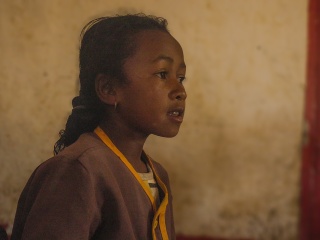

A commitment that stands the test of time
The promise of providing daily school meals encourages children into the classroom, giving them the opportunity to receive an education and the hope of a brighter future.
If you attend a Mary’s Meals event, watch one of our films or strike up a conversation with someone involved in our work, it probably won’t be long before you hear the word “promise” – a notion that is central to our school feeding programme and its lasting impact on children and communities.
For more than 20 years, Mary’s Meals has been working in partnership with communities affected by poverty and food insecurity to consistently fulfil the promise that children receive a meal every school day. With more than 2.6 million children currently relying on our meals, this is a large and important responsibility.
But why is this commitment so fundamental to what we do and the children we serve?

Reducing child hunger at school
Children are at the centre of everything we do at Mary’s Meals. Our first priority is that they are not hungry while they attend a place of education, because we know that reducing children’s hunger is a critical part of increasing their readiness to learn.
Our independently verified research has found that Mary’s Meals reduces hunger for both boys and girls year on year, and that the initial reduction in hunger levels reported in the first year of children receiving our meals is also sustained over time.
In Mozambique, for example, research found that before the programme started, 93% of children said they felt hungry every school day (five days per week). When children began receiving the meals, 92% reported that they never worry about hunger at school.

Improving access to education
An estimated 71 million primary age children are currently out of school at a time when conflict, economic hardship and extreme weather continue to disproportionally affect the most vulnerable communities. The loss of learning has deepened existing inequalities, with those who were already marginalised the least likely to return to, re-enrol at or access school.
School meals are a proven incentive for children to attend school, and schools where our meals are served report increased enrolment and attendance. Across our Kenya, Liberia, Malawi and Zambia programmes, almost 71% fewer children are dropping out of school as a result of Mary’s Meals. This is echoed by the children we spoke to in the same four countries, 75% of whom say they never leave early during the school day because of hunger.[1]
It is the acute need experienced in the communities where the meals are served that links each of these outcomes. We focus our work on areas where poverty and poor access to education are hindering children’s development, and where communities are battling with challenges such as climate change, conflict and food insecurity.
[1] Mary’s Meals Impact Report, 2024

More than a meal in Madagascar
When Aimee, a pupil in Madagascar, describes her walk to school, it’s hard to imagine this softly spoken eight-year-old could make such a journey every morning, but she describes it in such detail that it’s clear it’s a familiar route.
“I follow the way out of the village, then I walk on the rice field dikes, then I cross a river, I climb [a] mountain, I follow the road, I go through the eucalyptus forests, I cross a river again, I walk again, then I arrive at school.”
It takes her one hour in total each way.
Making Aimee’s story even more remarkable is that she used to do it with so little to eat each day. Back then, it was a much slower walk, and her hunger affected her whole day at school.
She says: “Before the canteen, I was hungry. I could not go fast. I could not do effort or study well at school. I was hungry when going home from school.”
Now that Mary’s Meals is a regular part of her school day, Aimee has felt a big difference. She sits attentively in class, and when asked a question by the teachers, stands respectfully to answer it. She is sure this concentration comes from not being hungry anymore.
“Since the school feeding, I am not hungry, and I study well at school. The benefits I get are that I am full, and I can focus and listen to the teacher.”
Aimee’s future may involve yet more bumps and turns in the road, but with the promise of nutritious school meals helping her make the most of her education, the path ahead will be much smoother.
It costs just £19.15, €22, $25.20 USD or $31.70 CAD to provide a child with life-changing daily meals for an entire school year. Your donation can help children experiencing poverty and hunger to change the trajectories of their lives – both right now, and for years to come.
It’s more than just a meal – it’s the potential for a better, brighter future.